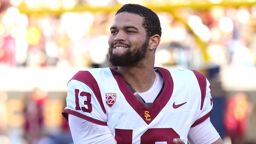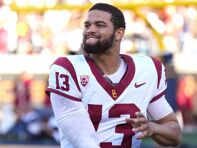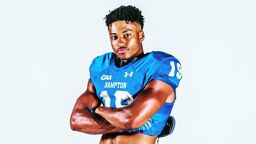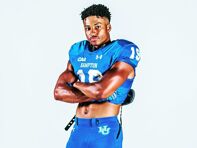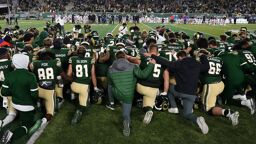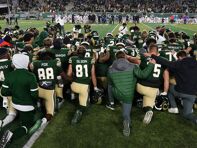Former University of Miami running back T.J. Callan has long recognized the intersectionality of being a gay man, a black man and a gay black man. Callan, 22, left the Miami program after experiencing what he described as a hostile environment, where gay people were spoken of in derogatory terms, ultimately keeping him in the closet.
Outsports recently spoke with Callan about how the history of black athletes coming out, and specifically black gay men, has been particularly meaningful to him.
Two prominent examples whose coming out announcements had an impact beyond sports are Jason Collins, the first NBA player to come out in 2013, and Michael Sam, the first openly gay player drafted in the NFL in 2014. Both of their stories were huge, spilling out from sports into mainstream news and culture.
Collins and Sam are far from the only out black LGBTQ athletes to have made a difference. Derrick Gordon was the first active Division I men’s basketball player to come out as gay in 2014. Brittney Griner, Seimone Augustus, Angel McCoughtry, Nicola Adams, CeCé Telfer and Caster Semenya are among prominent female black athletes who have come out. For Callan, these stories resonate because he sees the power and courage in what they did.
”A person of color has to deal with not only being gay, but being black, and then being black and gay,” Callan said. “I feel like they are all three completely different challenges.”
The first obvious struggle is the history of discrimination against black people in U.S. history. In addition, Callan says gay black men often deal with what he calls the hypermasculinity in black culture.
“I feel like culturally it is very prominent … I’ve seen a lot of it in marginalized communities. It’s embedded in a lot of black culture,” he said. “Some have said, ‘Oh, you want to be a girl?’” he said.
Further, Callan says that as a black man in the larger gay culture “you do experience racism within the gay community. More often you experience microaggressions and comments that are offensive and dismissive of minority communities,” he said.
As an example of the latter, he recalled meeting one white gay man who told Callan, “‘I thought you were gonna be ghetto, you’re not,’ and I’m like, ‘What are you talking about?’ It can be very frustrating. And you would think that a lot of gay men would understand and empathize with the fact that you are a part of multiple marginalized communities, but in a lot of cases, there is a lack of understanding.”
Navigating this terrain gave him an appreciation for the courage it took for people like Collins and Sam to come out. “I feel like I’m living three very specific experiences and when you see other people in that position, I could relate to that,” Callan said.

Their coming out gave Callan, then a teenager, pride.
“For young people like me, it can be very inspiring and could give strength and encouragement to others who share similar identities. To know that there are out pro athletes is important.”
There was one aspect of Sam’s coming out that really hit home for Callan. “I saw Michael Sam get drafted, and he kissed his boyfriend and I was like, shit, that is amazing. It was nice to see that Sam could stand in his truth.”
He also appreciated as a football player that someone like Sam could come out in what is considered a hypermasculine sport because it challenged the idea and stereotypes linking being gay to “being weak.”
Callan never came out while at Miami and doubts that it would have made a difference in his experience if he did. “I felt very insecure about it [being gay] and I feel like maybe they picked up on it because I didn’t want to speak about it.”
“I was not in a supportive environment nor did I feel safe to share my identity. I could not take the chance to openly embrace who I am. I wish it could have been different… and hope one day it will be less of a touchy subject.”
Since coming out, Callan says he has received nothing but positive comments and support, and says his only regret during his college years was not having other active gay football players he could reach out to.
Visibility is ultimately one reason he decided to come out, and he hopes to be the role model for others he wished he had when he was struggling.
You can find T.J. Callan on Instagram @tjthelamphead, or on Facebook.


